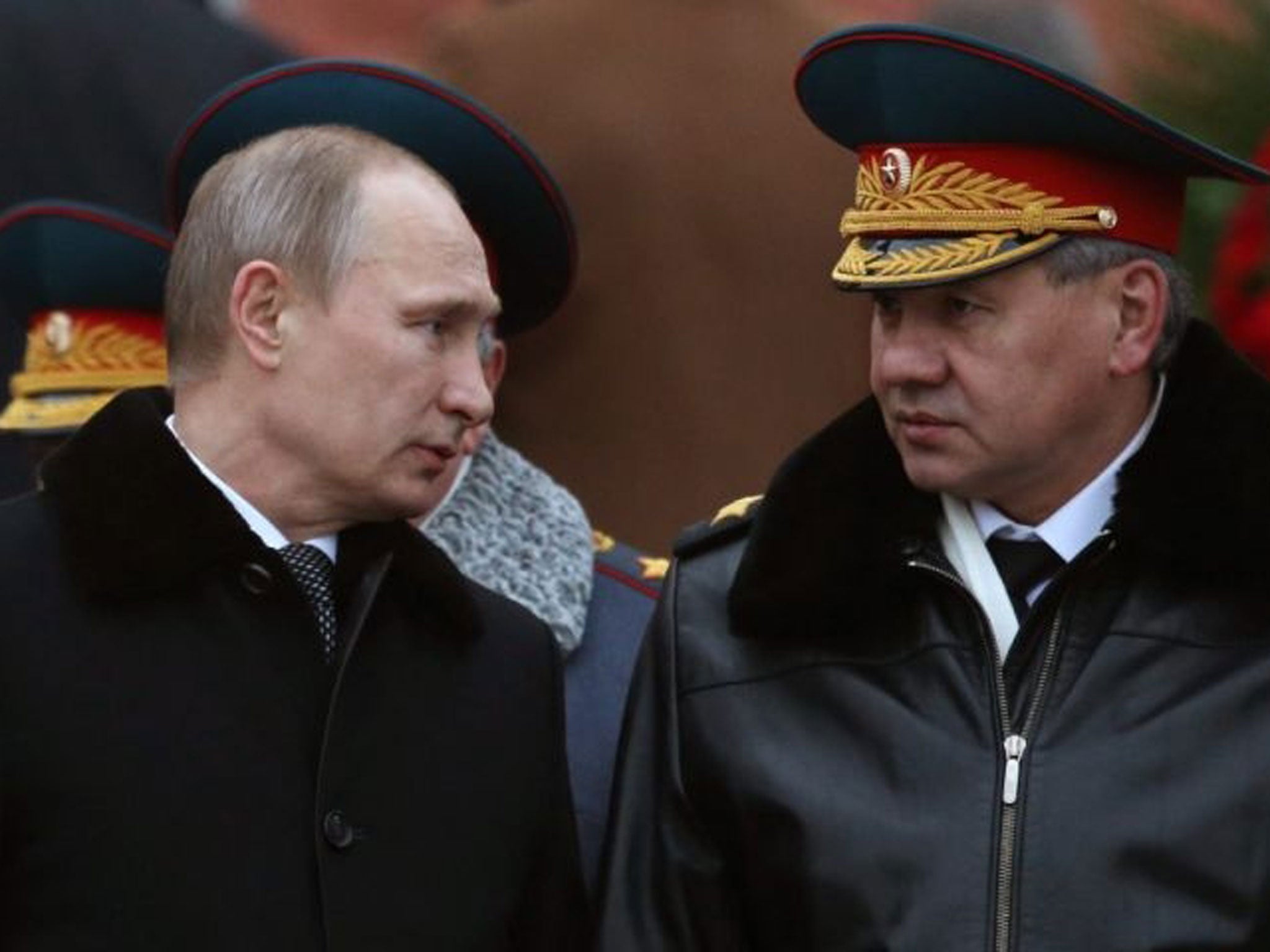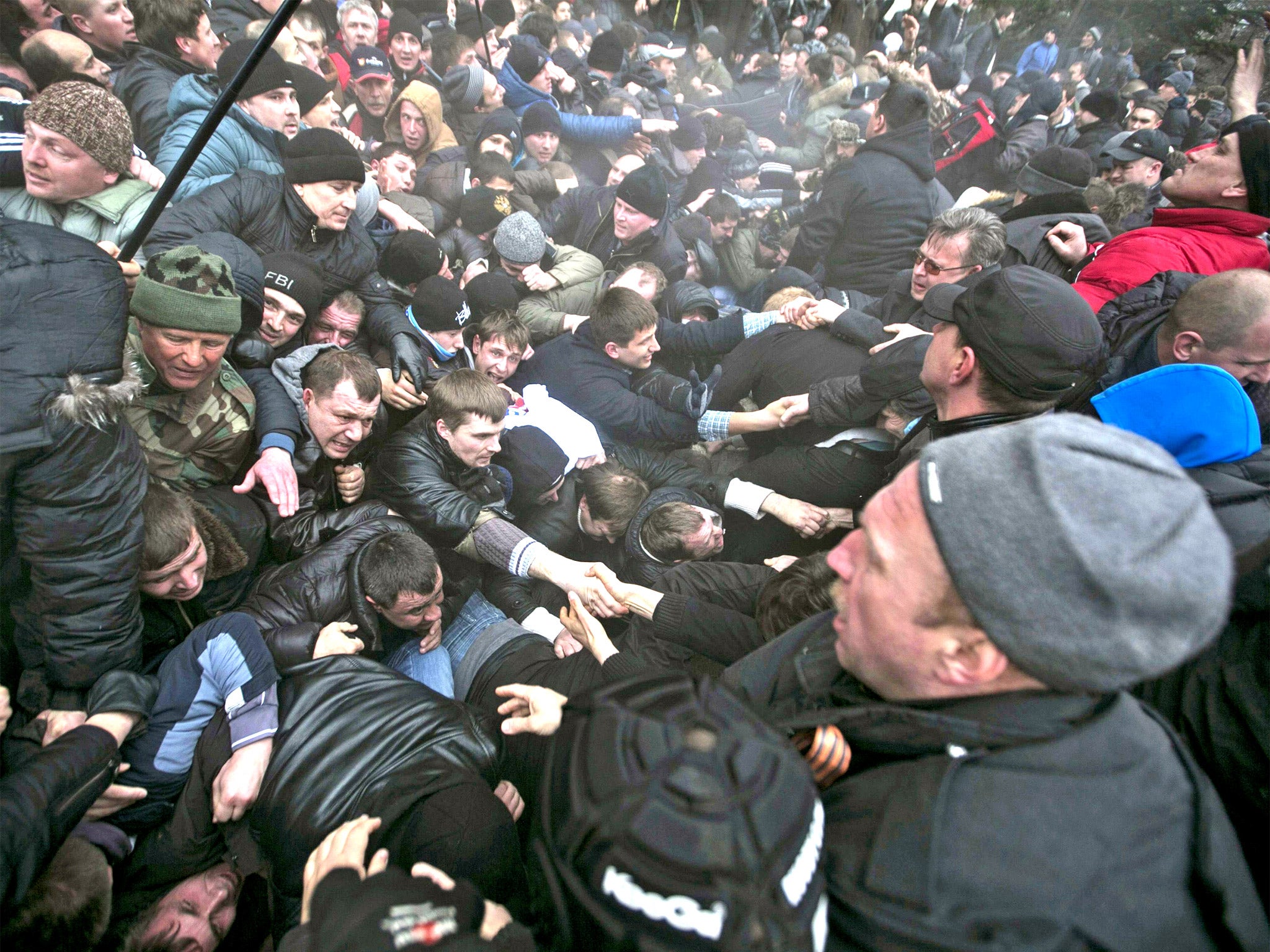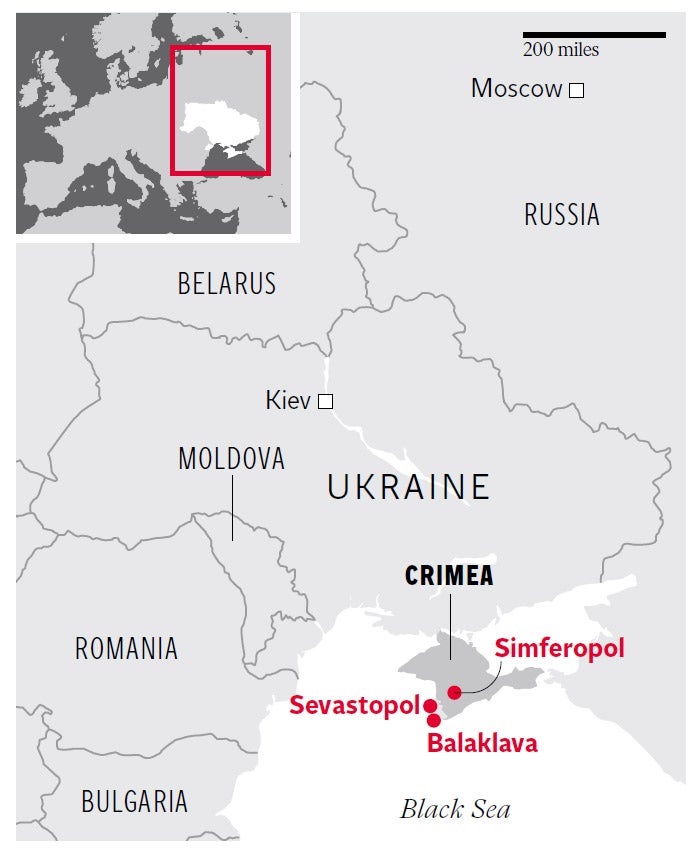Ukraine crisis: President Vladimir Putin puts Russia on war footing
150,000 troops ordered to move immediately to a state of combat readiness

International tensions over the unfolding crisis in Ukraine have escalated dramatically after Vladimir Putin ordered an urgent test of combat readiness of the Russian military’s western and central command.
The exercise, involving 150,000 of precisely those forces which are likely to be used for any intervention, and their reserves, came amid growing claims that the country faces the threat of breaking up, as protests and violent sectarian clashes continue.
The sabre-rattling from the Kremlin was accompanied by complaints that the new administration formed after the overthrow of President Viktor Yanukovych had allowed “extremists and right-wing nationalists to impose their will” and stir up religious animosity.
Monasteries and clergy of the Russian Orthodox Church had been threatened, the Russian foreign ministry said, with the aim of creating “an even bigger schism in Ukrainian society”.
There was an immediate riposte from three former Ukrainian presidents who accused Moscow of actively encouraging sedition in the autonomous republic of Crimea, where ethnic Russians make up the majority of the population and are spawning a growing separatist movement. Crimea is part of Ukraine, but has its own parliament and government, with powers over some sectors.
Ukraine’s interim President, Oleksandr Turchynov, warned of his “grave concern” of the “serious threat of separatism” ahead of emergency talks with security chiefs. “We discussed the question of not allowing any threats to territorial integrity and punishing people guilty of this,” he said.
John Kerry, the US Secretary of State, warned that Russian military intervention in Ukraine would be a “huge, grave mistake”. “For a country that has spoken out so frequently against foreign intervention in Libya, Syria, elsewhere, it would be important for them to heed those warnings as they think about options in the Ukraine,” he added.
The new authorities in Kiev have issued an arrest warrant for Mr Yanukovych, and there was an unconfirmed report by the Russian RBC news agency that he had been seen in Moscow and at a health resort. The Russian Border Service would not confirm or deny if Mr Yanukovych had entered the country.
Tonight Mr Turchynov was announcing the composition of a new administration to a crowd in Kiev’s Independence Square, following the West’s advice that it should be inclusive of differing views.
Events in Crimea underlined the extent of the bitter divisions consuming post-revolutionary Ukraine. More than 20,000 ethnic Tatars tried to force their way into parliament in the region’s capital, Simferopol, amid cries of “Allahu Akhbar” (God is great). More than 25 people were injured and a man died from a suspected heart attack after being trapped in a crush.
Afterwards a Tatar community leader, Refat Chubarov, called for “self-defence volunteers” to be formed”.
The Tatars, the largest Muslim community in Ukraine, who can trace their ancestries back to the warriors of Genghis Khan and Tamerlane, remain bitterly resentful towards Moscow. They were deported from here, their homeland, by Joseph Stalin at the end of the Second World War, and only began to return in the 1990s.
They had gathered to show their opposition to secession, and to attempt to stop deputies inside from introducing regulations which would allow the local Russian majority to replace mayors appointed by the government in Kiev. But the Islamic religious chants incensed some among the Russians mounting a counter-demonstration.

“That is what Muslim terrorists shout – that is why we need our security forces to be strong,” declared one protester, Nikolai Vorisilov. “But the criminals in Kiev are actually weakening the security forces. That is why we need help from President Putin.”
Mr Vorisilov, a former Soviet customs official, said he was angered by the announcement by Mr Turchynov that the Ukrainian riot police, the Berkut (Golden Eagles), would be disbanded. The unit has been accused of responsibility for the killings of more than 80 protesters during clashes at Kiev’s Independence Square.
The news of the riot police being broken up brought loud cheers from the Tatars and counter shouts of “Berkut! Berkut!” from their opponents. The Crimean parliament had been considering paying the local officers out of the local public budget. One of the young men who had been shouting Islamic slogans, 22-year-old Suleiman Kadirov, demanded that they should instead be tried for the killings. He said he was not worried that the Berkut would be replaced by a force from the Kremlin.
“The Russians have been fought by Muslims in Afghanistan, Chechnya. That is happening in Syria now. So we can do it if necessary.”
The crowd continued to grow this afternoon with the pro-Moscow contingent reinforced by bus-loads from the nearby Russian-majority port city of Sevastopol, increasing their numbers to around 7,000. Soon afterwards, microphones from near a nearby Orthodox church began to play the Russian national anthem.

Slogans and insults hurled among the protagonists turned to punches and kicks after a Ukrainian flag was seized and torn up by a group of young pro-Russian men. “This is no longer a national flag; it’s a traitor’s flag,” was the view of one of them.
Some of the pro-Russian demonstrators said they had been reassured by a visit to the area by Russian parliamentarian Leonid Slutsky, who had stated: “If the life and health of our compatriots is under threat, we will not stand to one side”. The MP, head of the Duma’s committee for relations with former Soviet states, said he did not want to elaborate on what type of action would be taken.
In Sevastopol, where the Russian navy’s Black Sea Fleet is based, two armoured personnel carriers appeared on the street. A spokesman at the base refused to comment on the reason for the deployment, but local media claimed they had been told it was to “counter terrorist attacks”.
“The Russians, they have respect for no one,” Ramzi Zagaliev said at the Tatar demonstration. “They treat other people with contempt. Look what they did to us: they took us away from our homeland and it took us 70 years to get back.”
Anastasia Cherkov and Alexandra Ivanov, both law students, were deeply worried by what they had witnessed at the rally. “Of course as women we do not want to hear all these Muslim religious things being shouted; what will the future mean for us if these people get power?” Ms Cherkov, 19, said. “We are also depressed about what is happening in Kiev. It is coming near to us now, some of these people from the Maidan tried to come here a few days ago. Luckily the police turned them away, but supposedly they were brought back secretly by some of the people here.”
Ms Ivanov said: “We are studying law, but will there be any law left in this country? The only way we can have safety is if we join Russia.”
The issue is dividing families in Crimea. Another university student, Lilia Kerimova, 19, of mixed Tatar- Russian parentage, said: “My mother is Russian and she wants us to belong to Russia. But she is an older generation. I cannot understand how young people could also feel the same way. We will gain nothing by joining Russia; but then if we join the European Union our farmers will suffer and prices will go up.
“My friends and I can’t see anyone who is going to be a good leader: most of our politicians are corrupt. It is depressing being a Ukrainian at the moment.” fused to comment on the reason for the deployment, but local media claimed they had been told it was due to “counter terrorist attacks”.
“The Russians, they have respect for no one,” Ramzi Zagaliev said at the Tatar demonstration. “They treat other people with contempt. Look what they did to us: they took us away from our homeland and it took us 70 years to get back. But there will be justice. As the Koran says, ‘Those who treat us with arrogance will be companions of fire.’”
Anastasia Cherkov and Alexandra Ivanov, both law students, were deeply worried by what they had witnessed at the rally. “Of course as women we do not want to hear all these Muslim religious things being shouted; what will the future mean for us if these people get power?” Ms Cherkov, 19, said. “We are also depressed about what is happening in Kiev. It is coming near to us now, some of these people from the Maidan tried to come here a few days ago. Luckily the police turned them away, but supposedly they were brought back secretly by some of the people here.”
Ms Ivanov said: “We are studying law, but will there be any law left in this country? The only way we can have safety is if we join Russia.”
The issue is dividing families in Crimea. Another university student, Lilia Kerimova, 19, of mixed Tatar- Russian parentage, said: “My mother is Russian and she wants us to belong to Russia. But she is an older generation. I cannot understand how young people could also feel the same way. We will gain nothing by joining Russia; but then if we join the European Union our farmers will suffer and prices will go up.
“My friends and I can’t see anyone who is going to be a good leader: most of our politicians are corrupt. It is depressing being a Ukrainian at the moment.”
Join our commenting forum
Join thought-provoking conversations, follow other Independent readers and see their replies
Comments
Bookmark popover
Removed from bookmarks